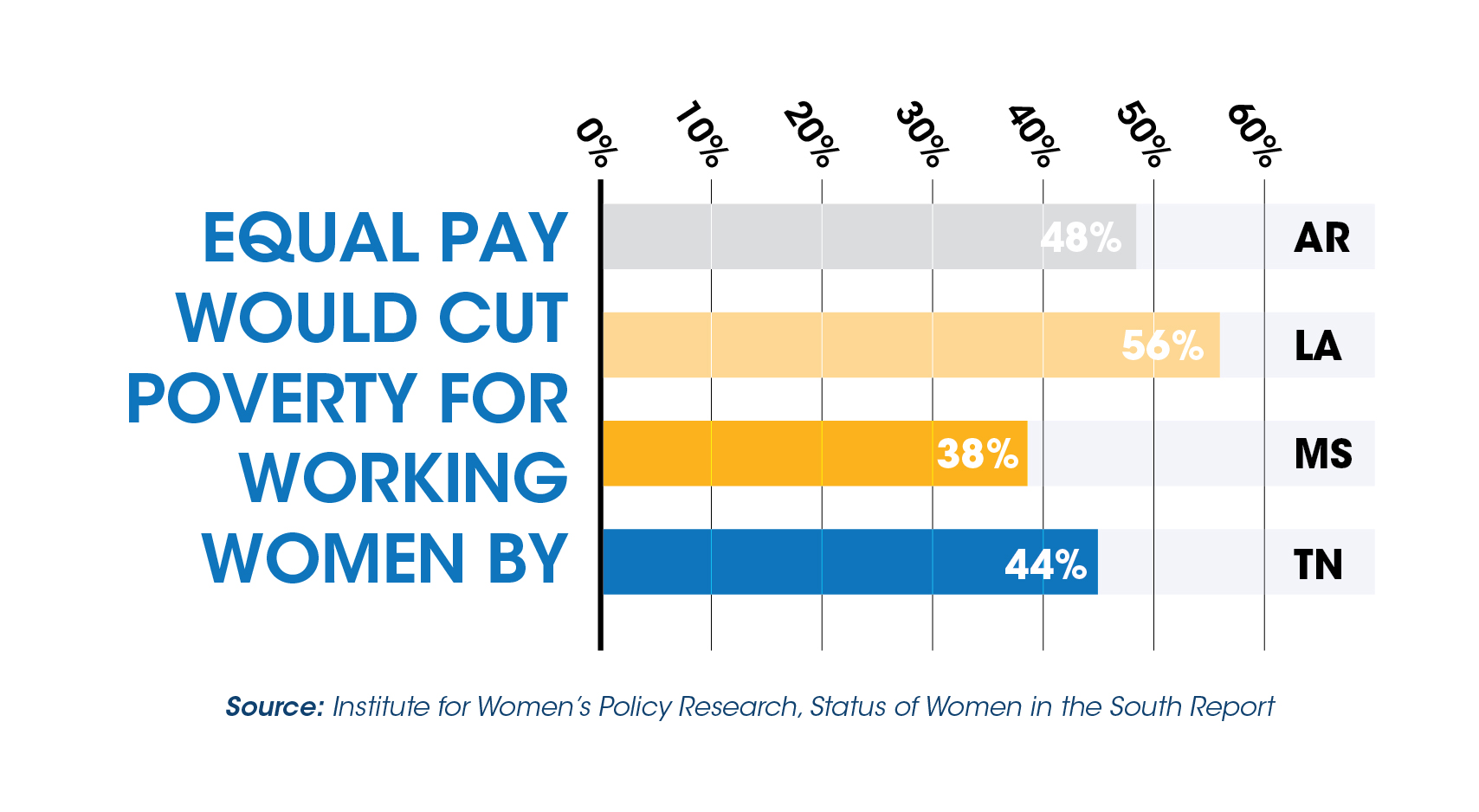Status of Women in the South: Employment and Earnings
March 11th, 2016

To coincide with Women’s History Month, the Hope Policy Institute will explore findings throughout this month from a recently released report from the Institute for Women’s Policy Research entitled Status of Women in the South. Last week, our blog highlighted some of the challenges faced by women and families in persistent poverty that make economic mobility difficult. In the South and particularly in the Mid South, which includes Arkansas, Louisiana, Mississippi and Tennessee, women’s employment status and earnings have major implications for the economic well-being and security of their families.
Based on the Employment & Earnings Composite Index*, Arkansas, Louisiana and Mississippi received an average letter grade of “F” and ranked among the worst in the South**. Tennessee received a letter grade of “C-.” The information below highlights some findings related to employment and earnings for women in the Mid South states.
- Women in the Mid South earn less. Nationally, women had median annual earnings of $38,400 in 2014. In contrast, women in Arkansas and Mississippi had median annual earnings of $30,000, the lowest in the nation. Women in Louisiana had the second lowest median annual earnings among the southern states, at $31,200, while Tennessee had the fifth lowest among the southern states, at $34,000.
- Earnings for women differ by race. Louisiana and Mississippi tie for the lowest earnings for black women, with median annual earnings of only $25,000 (compared to Texas where black women have the second highest earnings in the South at $35,000). Black women outside of southern states have earnings $8,000 more than black women in southern states. Arkansas had the lowest earnings for white women, with median annual earnings of $32,000 (compared to Virginia where white women have earnings of $45,000).
- Women earned significantly less than men. According to Status of Women in the South, factors that contribute to the gender earnings gap include “women’s and men’s continued concentration in different occupations and industries, women’s greater caregiving responsibilities (and consequent workforce interruptions), and discrimination in the labor market.” The gender earnings gap is lowest in Louisiana, where women earned just 65.0 percent of what men earned (compared to 80.0 percent nationally). Equal pay would cut poverty for working women by 38% in Mississippi and by half for the rest of the Mid South states. See chart. This would create greater earning potential and better opportunity for women to achieve economic security for their families.
The economic inequalities highlighted above are just some of the challenges faced by women and families in the Mid South that make economic mobility even more difficult. The data underscore the need to develop opportunities that build supports to help women stay in the workforce and improve the quality of jobs that create better life outcomes for women and their families.
Follow our #PolicyMatters blog all month as we take an in-depth look at the issues that women face as well as women’s progress in the Mid South. Like us Facebook and follow us on Twitter to stay informed!
*A Composite Index is calculated based upon that state’s scores on component indicators; the states are then ranked from best to worst and a letter grade is assigned based on the difference between a state’s performance in that area and goals established by the Institute for Women’s Policy Research
**In the report, southern states include Alabama, Arkansas, the District of Columbia, Florida, Georgia, Kentucky, Louisiana, Mississippi, North Carolina, South Carolina, Tennessee, Texas, Virginia, and West Virginia
Status of Women in the South Blog Series
- Women in the Mid South Continue to Face Obstacles
- Employment and Earnings
- Poverty and Opportunity
- Work and Family
Source:
Anderson, J., Shaw, E., Childers, C., Milli, J., & DuMonthier, A. (2016). The status of women in the South. Retrieved from http://statusofwomendata.org/app/uploads/2016/02/SWSouth2.24-for-posting-online.pdf







